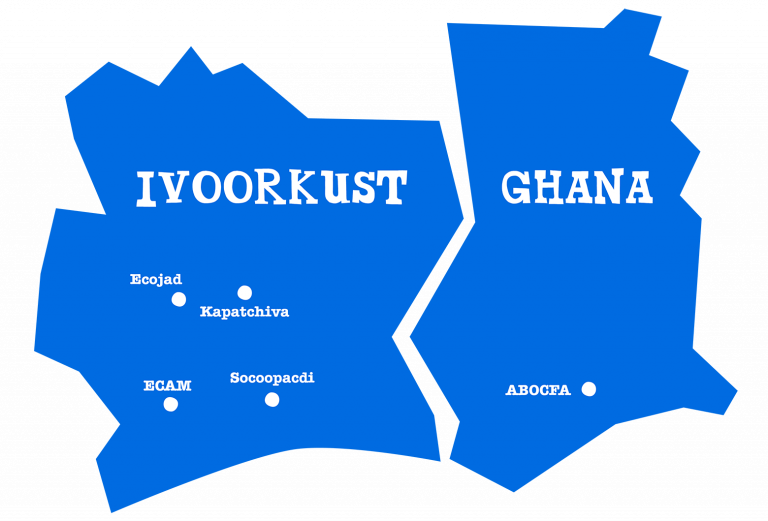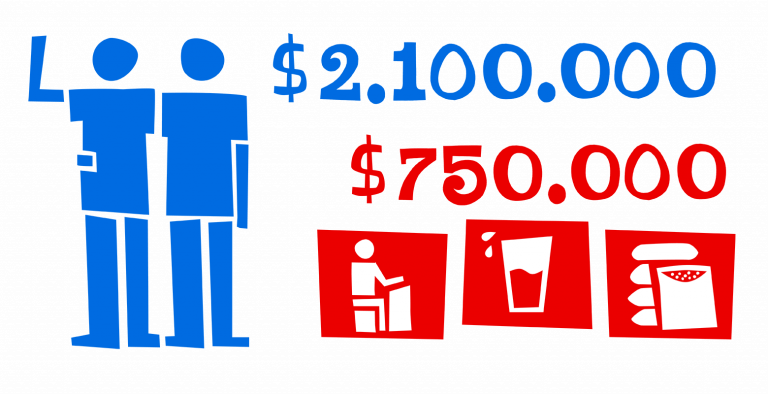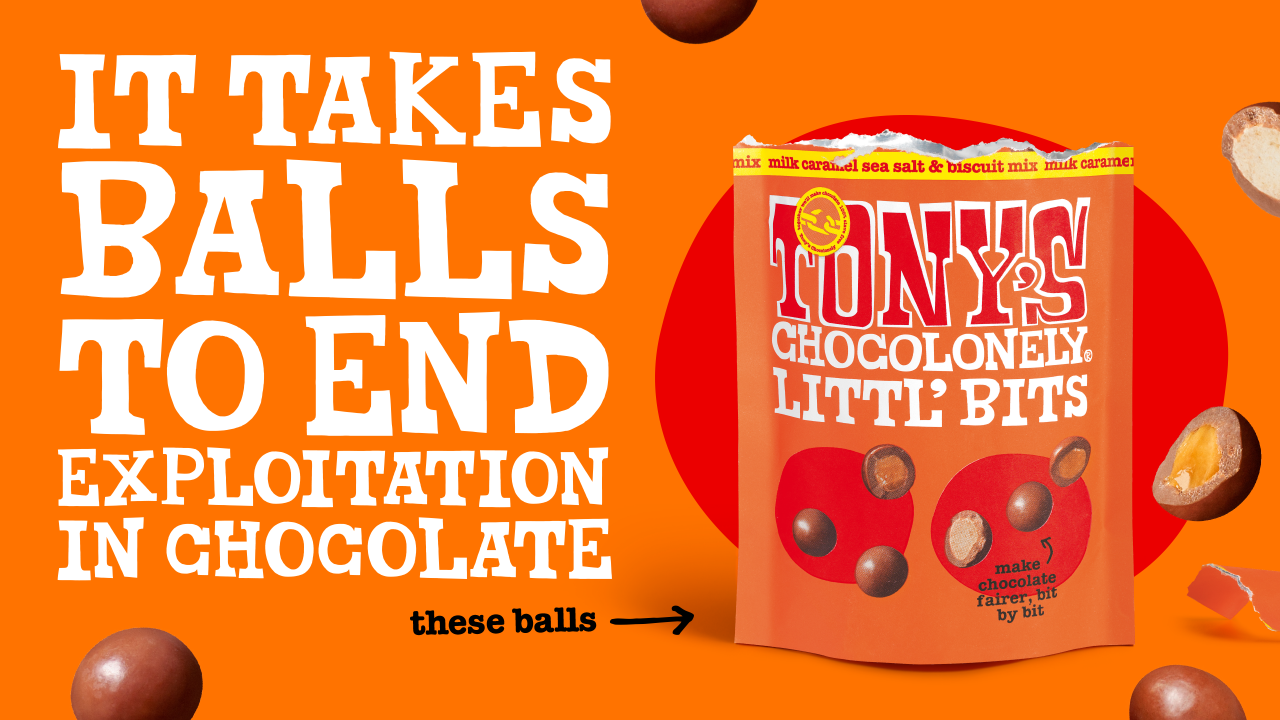Strong farmers, professional cooperatives
We’re repeating it one more time. Teamwork makes the dream work. We’re nothing without our partner cooperatives in West Africa. Every single little bean in a Tony’s Chocolonely chocolate bar originates from Ghana at partner cooperative Abocfa or from Ivory Coast at partner cooperatives Kapatchiva, Ecojad, ECAM and Socoopacdi.


Tony’s premium
As you will know by now, Tony’s pays farmers a higher price through its Tony’s Premium. The cooperatives play an important part in this respect: they jointly decide what they’ll spend the money on. This decision is recorded in a premium plan. At the end of the season, when the exact amounts are known, this plan is approved by the members during the annual meeting.
Piece of cake, right? Well, not quite. Since the farm gate price fell so much in the Ivory Coast, we had to more than double our premium last year. We also bought more beans than ever! So, that was a huge challenge for the cooperatives, namely to make sure that all this money was spent properly and fairly. How about joint investments? a new truck? Computers? Definitely essential for the professionalization of the cooperatives, so certainly not a bad thing. But the most important thing is that the farmers’ income goes up or that they can lower their costs. So, more money and tools go straight to the farmer and more joint investments benefit everyone. We discussed everything with the cooperatives and the premium plans were adjusted afterward.
The members of a cooperative can also decide to divide the premium among all its members because they want to treat all members equally. That’s definitely understandable because this lets way more farmers benefit from the premium, although the amount will be lower per farmer. Needless to say, we’ll continue to talk about such dilemmas with the cooperatives. This year, the farmers decided to spend the premium like this:
Impact studies
The insights of the cocoa farmers are tremendously important for eradicating illegal child labour and structural exploitation in the chain. On every trip to West Africa we talk with cocoa farmers at annual meetings, during training sessions, etc. This year we went a step further and asked the KIT – Royal Tropical Institute – to investigate the impact of our activities. What do the farmers really think of our approach and the impact of our actions on their lives?
Most farmers are positive about their relationship with us. The study shows that our the rules of the game are important. Below you’ll find a number of key points from the study, which will be included in our strategy:
- Farmers and cooperatives are happy with the premium. The timing of the payment (just before the start of the school year) means that it’s easier for farmers to send their children to school.
- We don’t yet have any hard figures that prove to what extent the premium has improved the farmers’ incomes.In practice, the premiums don’t necessarily lead to a living income.
- The long-term relationships are essential for the cooperatives – they provide more stability and thus give farmers and cooperatives the opportunity to invest more.
- The farmers say they have a lot of confidence in their cooperatives. We and the cooperatives worked our socks off for that, so we’re really glad to hear it!
Tony’s investigation into child labour: initial results
We’ve been working with the CLMRS for a year now. Hang on.. with what? With a serious program with a long name: The Child Labour Monitoring & Remediation System (42 letters, seven words, double-check if you like). The CLMRS helps us gain insight into child labour at farms who are members of our five partner cooperatives. The CLMRS was developed by the International Cocoa Initiative (ICI) together with Big Choco Nestlé and they did a chocolate-worthy job.
So, how are things going? In the past, various parties did a lot to combat child labour. Child labour is illegal in both Ghana and the Ivory Coast and this is also stated in the criteria of the sustainability certifications. That’s why parents, farmers and cooperatives find it quite nerve-wracking to talk about child labour. Through the CLMRS, we try to create a familiar environment that encourages talking about child labour. In addition to awareness activities on children’s rights in the cocoa communities, we collect social data to find out whether, where and why child labour occurs.
So.. did CLMRS do its thing over the past year? Heck yeah. We have now visited 3,072 households and interviewed 3,935 children between the ages of 5 and 17. So far, members of our partner cooperatives have participated in 936 sessions focusing on children’s rights. And 268 cases of child labour have been identified at our partner cooperatives. And that’s at the very least. Because CLMRS cannot guarantee we have found find all cases of child labour and CLMRS community facilitators have not yet visited all of the farmers. These cases are usually children who help their parents a few hours a week. So, we’re not talking about human trafficking, let’s make that clear.
We started providing the following solutions to reported cases of child labour (= remediation):
- We arranged birth certificates for 185 children so they could go to school. You’re only allowed to go to school if you have a birth certificate. We distributed 172 school packages (with things such as school uniforms, bags, math kits and sandals). And we handed out eleven bicycles so children could get to school more easily.
- We arranged 100 medical checks and, for 107 children, healthcare insurance – to make sure children are/stay healthy and don’t have to stay home sick.
- We distributed 29 wheelbarrows. Wait, wheelbarrows? Yes! So children don’t have to lift heavy weights when they help their parents after school. We’re also paying for professional training for four teenagers to give them other career opportunities.


By far the largest part, more than 2.1 million, went directly to the farmers and their communities. 750,000 was invested in things like schools and wells. Plenty was invested in the cooperatives themselves: in better cocoa storage, trucks and reinforcement of the organization.
This year, 5,021 farmers supplied us with 7106 metric ton (mt) cocoa beans through the cooperatives. Over the past year, we’ve made significant investments in the cooperation with and professionalization of our partner cooperatives. And what’s really awesome is that this year, for the first time, every cooperative drew up a strategic five-year plan (with a little help from us and Fairtrade). This plan contains a clear mission, vision and strategy for the coming years. Most of them want to at least grow larger and eradicate child labour completely.























